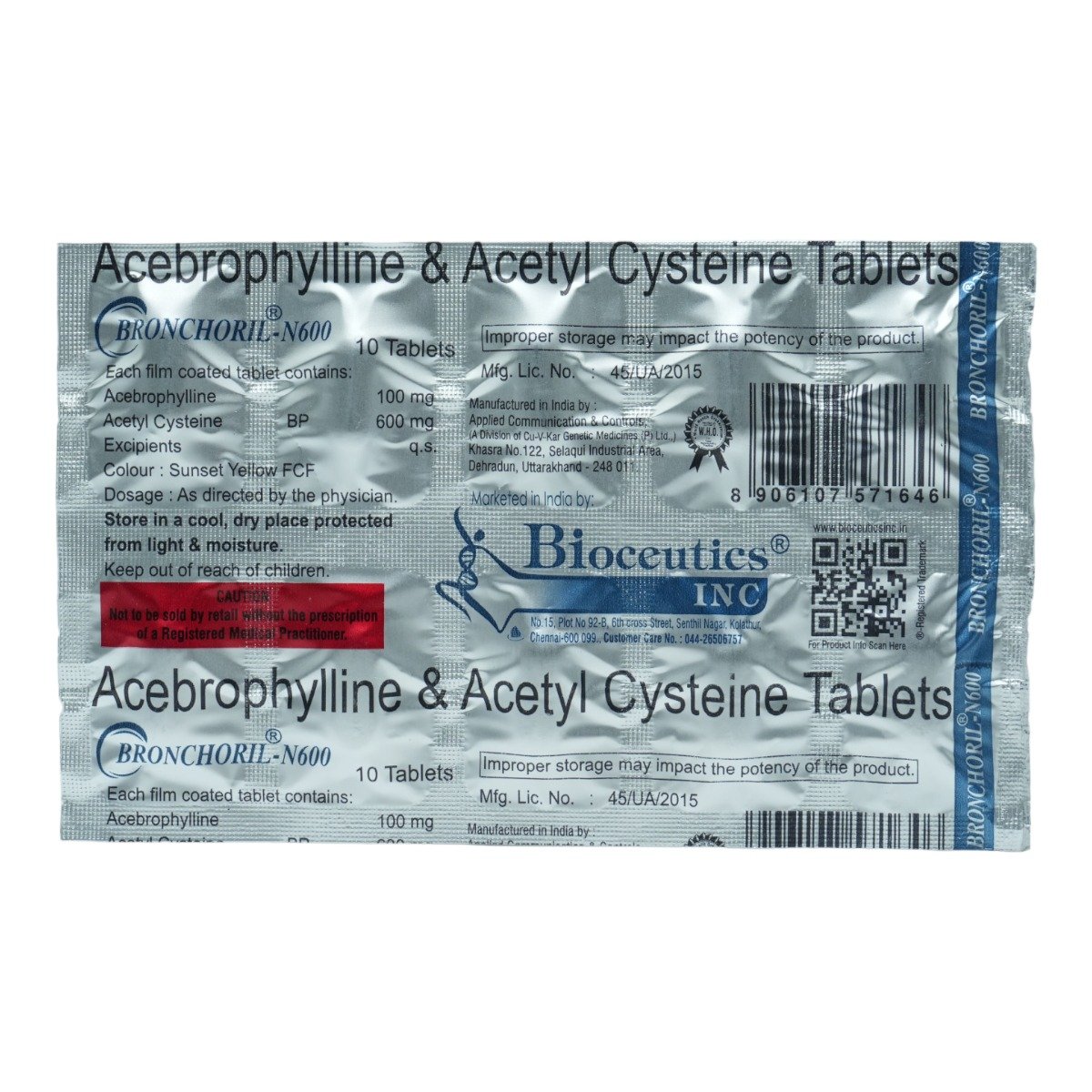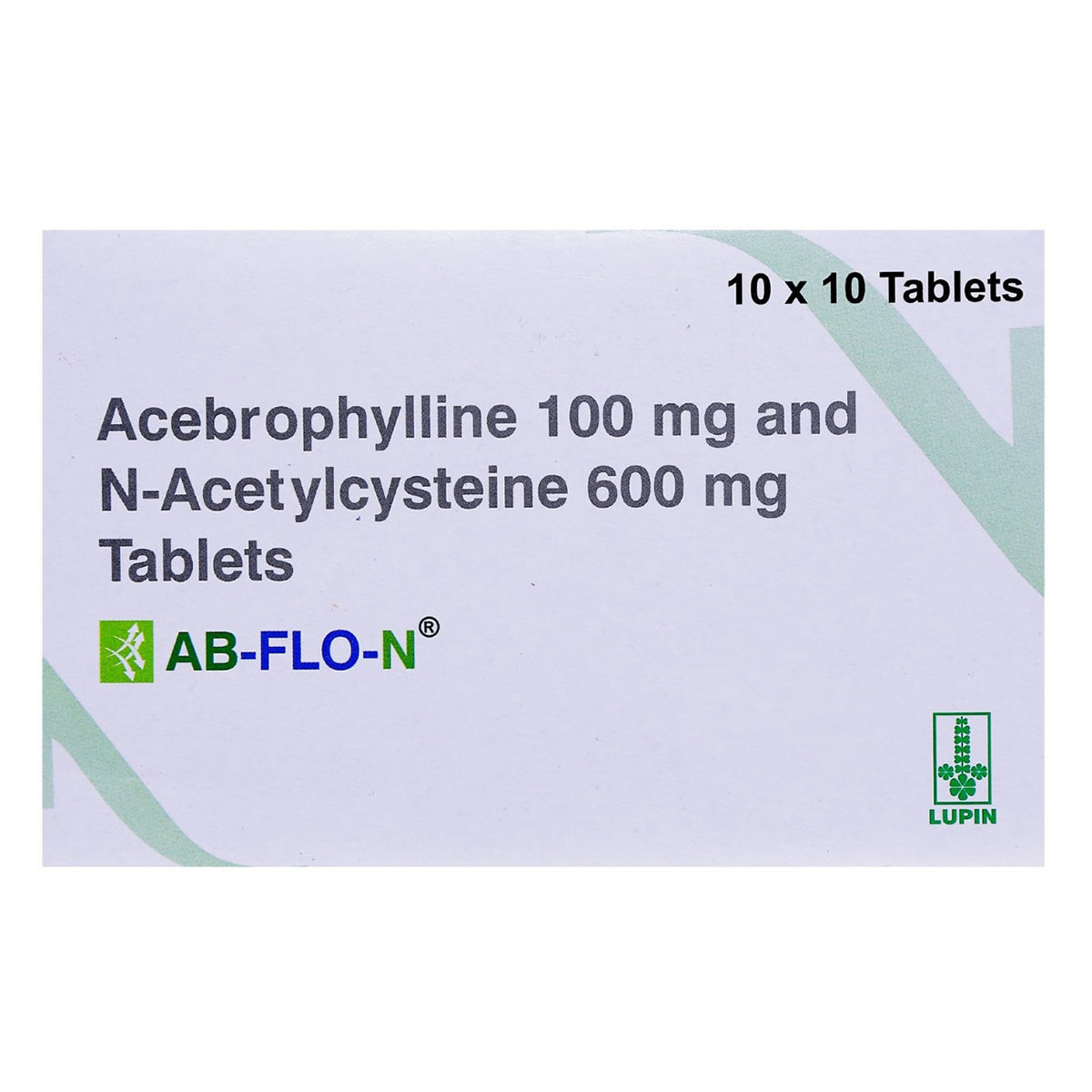- Home
- Pulmoguard Tablet
Pulmoguard Tablet Substitute
Pulmoguard Tablet Substitute
Medicine Composition:
ACEBROPHYLLINE-100MG+N ACETYLCYSTEINE-600MGAll Substitutes & Brand Comparisons
RX
Dilo-Nac Tablet 10's
Corona Remedies Pvt Ltd
₹123
(₹11.08 per unit)
35% CHEAPERRX
Acebronk-N Tablet 10's
Citizen Life Science Pvt Ltd
₹140.5
(₹12.65 per unit)
26% CHEAPERRX
Breathonac AB Tablet 10's
Enine Remedies Pvt Ltd
₹173.5
(₹15.62 per unit)
8% CHEAPERRX
Ab Nac Tablet 10's
Alexon Healthcare
₹182.5
(₹16.43 per unit)
3% CHEAPERRX
Out of StockAcebrogold Tablet 10's
Acinom Healthcare
₹166
(₹16.6 per unit)
2% CHEAPERRX
Pulmotaz AB Tablet 15's
Lifeline Healthcare Pvt Ltd
₹277.5
(₹16.65 per unit)
2% CHEAPERRX
Bioclear Tablet 10's
Bio-well Pharmaceuticals Pvt Ltd
₹185.5
(₹16.7 per unit)
2% CHEAPERRX
Bigphylin-N Tablet 10's
ZRS Labs
₹186.5
(₹16.79 per unit)
1% CHEAPERRX
Nac AB Tablet 10's
Evaevo Lifescience Pvt Ltd
₹192
(₹17.29 per unit)
1% COSTLIERRX
Naclife-AB Tablet 10's
Hosprime Creating Better Life
₹199
(₹17.92 per unit)
4% COSTLIERRX
Acebrox AN Tablet 10's
Stallion Laboratories Pvt Ltd
₹185.5
(₹18.55 per unit)
8% COSTLIERRX
Mucotune AB Tablet 10's
Larsen Formulations Pvt Ltd
₹221
(₹19.89 per unit)
16% COSTLIERRX
Bronchoril-N600 Tablet 10's
Bioceutics Inc
₹225
(₹20.25 per unit)
18% COSTLIERRX
Out of StockAcedrite-N Tablet 10's
Aldrite Pharma Llp
₹224
(₹22.4 per unit)
30% COSTLIERRX
AB-Flo-N Tablet 10's
Lupin Ltd
₹252
(₹22.68 per unit)
32% COSTLIER

When Should You Consider Switching from Pulmoguard Tablet?
Patients may explore substitutes in the following scenarios:
- High monthly cost of Pulmoguard Tablet
- Non-availability in local pharmacies
- Generic recommendation by a doctor
- Side effects or better tolerability with alternatives
What to Know Before Switching
Before you switch from Pulmoguard Tablet to another medicine, here are some important points to keep in mind:
Same salt, different brands:
Most substitutes contain the same active ingredient - ACEBROPHYLLINE-100MG+N ACETYLCYSTEINE-600MG, but the fillers, coating, or manufacturing quality may vary slightly.
Consult your doctor first:
Even if the salt is the same, your doctor can confirm if the substitute is right for your condition, dosage, and health history.
Watch out for allergies or reactions:
Some people may react differently to certain brands due to inactive ingredients. If you notice any side effects, inform your doctor immediately.
Price ≠ effectiveness:
A lower-priced substitute doesn't mean it's less effective. Many generic medicines work just as well as branded ones.
Check the dosage form and strength:
Always match the substitute’s strength (e.g., 5mg, 10mg) and form (tablet, capsule, syrup) with what your doctor prescribed.
Uses
Pulmoguard Tablet is used in the treatment of Chronic obstructive pulmonary disease (COPD). The detailed uses of Pulmoguard Tablet are as follows:
- Chronic Obstructive Pulmonary Disease (COPD): Pulmoguard Tablet reduces mucus buildup and improves airflow.
- Bronchitis & Emphysema: Pulmoguard Tablet eases coughing, wheezing, and breathlessness.
- Asthma Support: Pulmoguard Tablet helps open airways and clear mucus.
- Cystic Fibrosis & Pneumonia: Pulmoguard Tablet assists in mucus clearance and respiratory comfort.
Medicinal Benefits
Pulmoguard Tablet is a combination of two drugs: Acebrophylline and N-acetylcysteine. Acebrophylline belongs to the class of bronchodilators with additional mucolytic properties and works by relaxing muscles and widening the lungs' airways. N-acetylcysteine is a mucolytic agent (cough/sputum thinner) that works by thinning and loosening phlegm (mucus) in the lungs, windpipe and nose. Pulmoguard Tablet breaks down the acid mucopolysaccharide fibres that make the mucus (sputum) thinner and less dense/viscous, thereby helps remove sputum efficiently by coughing. However, the viscosity of sputum remains low for as long as treatment is maintained. Together, Pulmoguard Tablet helps to cough out easily and makes breathing easier by opening airways.
FAQs
The substitutes of Pulmoguard Tablet contain the same active salt(s) - ACEBROPHYLLINE-100MG+N ACETYLCYSTEINE-600MG. However, they may differ in price, manufacturing quality, and inactive ingredients. Speak to your doctor to find a suitable option.
Switching to a generic substitute medicine in the place of Pulmoguard Tablet is often possible if it has the same salt, strength, and dosage form. But always check with your doctor before making any changes to your medication.
Generics versions of Pulmoguard Tablet are typically more affordable because they don’t include the original brand's research, development, and marketing costs. They contain the same active ingredient and are approved for safety and effectiveness.
Most people don’t notice any difference. However, some may react to different fillers or coatings. If you notice any unusual symptoms after switching, consult your doctor.
Make sure the new medicine has the same active salt, strength, dosage form. Always confirm the change with your doctor or pharmacist.
Substitutes of Pulmoguard Tablet meet the same safety and efficacy standards as Pulmoguard Tablet, but small differences in absorption or formulation can exist. A doctor can help you choose the right one for your needs.
Yes. Substitutes of Pulmoguard Tablet may vary in color, size, or shape due to differences in manufacturing and branding, but this does not affect how they work.
Yes, it’s generally safe to switch between multiple substitutes of Pulmoguard Tablet if they have the same salt and strength. However, always inform your doctor so they can monitor how your body responds.
Yes, many people safely use substitutes of Pulmoguard Tablet for long-term treatment. Just ensure it’s done under medical supervision.
If your symptoms stay under control or lab results remain stable, the substitute for Pulmoguard Tablet is likely working well. Regular follow-ups with your doctor are important.
Absolutely. Even with the same salt, small differences can affect how your body responds when switching from Pulmoguard Tablet to its substitute. Always consult your doctor before switching.
Pulmoguard Tablet is used to treat Chronic obstructive pulmonary disease (COPD).
Pulmoguard Tablet contains Acebrophylline and N-acetylcysteine. Acebrophylline belongs to the class of bronchodilators with additional mucolytic properties and works by relaxing muscles and widening the airways of the lungs. N-acetylcysteine is a mucolytic agent (cough/sputum thinner) that works by thinning and loosening phlegm (mucus) in the lungs, windpipe, and nose. Together, Pulmoguard Tablet helps treat COPD.
Pulmoguard Tablet should be used with caution in patients suffering from epilepsy (fits) as it may worsen the condition. Therefore, inform your doctor if you have a history of fits before taking Pulmoguard Tablet so that the dose may be adjusted or an alternate medicine may be prescribed.
You are not recommended to take Pulmoguard Tablet with antibiotics such as tetracycline, amoxicillin, amikacin and gentamicin at the same time as it may reduce the effectiveness of antibiotics. However, if you are supposed to take these medicines together, maintain a time gap of a minimum of 2 hours between Pulmoguard Tablet and antibiotics. Please consult a doctor before using Pulmoguard Tablet with antibiotics or any other medicines.
You are recommended to avoid taking Pulmoguard Tablet if you are allergic to acebrophylline, ambroxol, theophylline or suffering from irregular heartbeats, hemodynamic instability (unstable blood pressure), low blood pressure, liver or kidney disorders or had a heart attack. Inform your doctor if you have any of these conditions before taking Pulmoguard Tablet.
No, you are not recommended to smoke while taking Pulmoguard Tablet as it may reduce the effectiveness of Pulmoguard Tablet and also damage your lungs. Long-term smoking may cause breathing problems like asthma, bronchitis and COPD. Quitting smoking is the best way to keep your lungs healthy.
You are recommended to avoid histamine-rich foods such as tomatoes, wine, and processed foods. These may cause histamine intolerance by affecting the way histamine is broken down in the body, leading to symptoms such as flushing (redness of the skin), migraine headaches, skin rash, itching, and rhinitis (runny and stuffy nose). Therefore, if you are allergic to histamine or cannot tolerate food and drinks rich in histamine, please inform your doctor before taking Pulmoguard Tablet.
No, you are not recommended to stop taking Pulmoguard Tablet without consulting your doctor. Doing so may worsen your cough and other breathing problems, causing recurring symptoms. Therefore, take Pulmoguard Tablet for as long as your doctor has prescribed it, and if you experience any difficulty while taking it, please consult your doctor.
No, Pulmoguard Tablet does not relieve sudden asthma symptoms. Therefore, it is advised to always carry a rescue inhaler to treat sudden asthma symptoms.
No, Pulmoguard Tablet is not a steroid. It is a mucolytic agent, which means it helps break down and clear mucus from the airways, making it easier to breathe.
Pulmoguard Tablet may interfere with certain laboratory tests. To ensure accurate results, you must inform your healthcare provider and laboratory personnel about taking this medication before undergoing any laboratory tests.
Taking higher doses of Pulmoguard Tablet will not necessarily make it more effective. It can lead to increased side effects and potential harm. Following the prescribed dosage and consulting your healthcare provider if you feel the medication is not working as expected is essential.
Store Pulmoguard Tablet at room temperature, away from heat, moisture, and direct light, in its original container with a tightly closed lid. Keep it out of reach of children and pets. When disposing of Pulmoguard Tablet, do not flush it down the toilet or pour it into a drain unless instructed to do so. Instead, follow the specific disposal instructions provided by your healthcare provider or local waste disposal company.
Pulmoguard Tablet may cause some mild and temporary side effects in some individuals, including gastrointestinal symptoms, dizziness, and skin rash. Fortunately, these effects are usually self-limiting and resolve on their own without requiring medical attention. If side effects persist or worsen, rest assured that your healthcare provider is available to provide guidance and support to ensure your comfort and well-being.
Pulmoguard Tablet is a dual-action formulation composed of Acebrophylline, a mucolytic and bronchodilator, and N-acetylcysteine, a mucolytic agent. Acebrophylline relaxes airway muscles and widens lung airways, while N-acetylcysteine thins and loosens phlegm, making coughing easier. Together, these ingredients provide rapid relief from respiratory discomfort, facilitating easier breathing.
Buy best Respiratory System products by
Cipla Ltd
Glenmark Pharmaceuticals Ltd
Lupin Ltd
Alkem Laboratories Ltd
Sun Pharmaceutical Industries Ltd
Mankind Pharma Pvt Ltd
Macleods Pharmaceuticals Ltd
Zydus Healthcare Ltd
Leeford Healthcare Ltd
Dr Reddy's Laboratories Ltd
Zydus Cadila
Pristine Pearl Pharma Pvt Ltd
Abbott India Ltd
Intas Pharmaceuticals Ltd
Alembic Pharmaceuticals Ltd
German Remedies Ltd
Aristo Pharmaceuticals Pvt Ltd
Centaur Pharmaceuticals Pvt Ltd
Zuventus Healthcare Ltd
Wockhardt Ltd
Micro Labs Ltd
Koye Pharmaceuticals Pvt Ltd
Ipca Laboratories Ltd
GlaxoSmithKline Pharmaceuticals Ltd
Med Manor Organics Pvt Ltd
Seagull Pharmaceutical Pvt Ltd
Torque Pharmaceuticals Pvt Ltd
Blue Cross Laboratories Pvt Ltd
Medishri Healthcare Pvt Ltd
Yash Pharma Laboratories Pvt Ltd
Capital Pharma
Divine Savior Pvt Ltd
East West Pharma India Pvt Ltd
Fourrts India Laboratories Pvt Ltd
Indiabulls Pharmaceuticals Pvt Ltd
Tablets India Ltd
Uniza Healthcare Llp
Adonis Laboratories Pvt Ltd
FDC Ltd
Shreya Life Sciences Pvt Ltd
Corona Remedies Pvt Ltd
Indoco Remedies Ltd
J B Chemicals & Pharmaceuticals Ltd
Unipark Biotech Pvt Ltd
Vasu Organics Pvt Ltd
Intra Life Pvt Ltd
Wings Pharmacuticals Pvt Ltd
Best Biotech
Biological E Ltd
Skn Organics Pvt Ltd
Wanbury Ltd
Apex Laboratories Pvt Ltd
Entod Pharmaceuticals Ltd
Eysys Pharmaceutical Pvt Ltd
Gene Lifecare
Healthgate Pvt Ltd
Icarus Health Care Pvt Ltd
Innoglide Pharmaceuticals Pvt Ltd
Navil Laboratories Pvt Ltd
Stedman Pharmaceuticals Pvt Ltd
Zee Laboratories Ltd
Comed Chemicals Ltd
Lincoln Pharmaceuticals Ltd
Megma Healthcare Pvt Ltd
Precept Pharma
Stryker Pharma Pvt Ltd
Torrent Pharmaceuticals Ltd
Bacans Biotech Pvt Ltd
Dolvis Bio Pharma Pvt Ltd
Elder Pharmaceuticals Ltd
Emcee Pharmaceuticals (P) Ltd
Geno Pharmaceuticals Pvt Ltd
La Renon Healthcare Pvt Ltd
Pfizer Ltd
Prevego Healthcare & Research Pvt Ltd
Sanatra Healthcare Ltd
Timon Pharmaceuticals Pvt Ltd
Balin Healthcare Pvt Ltd
Brinton Pharmaceuticals Ltd
Embiotic Laboratories (P) Ltd
Heal (India) Laboratories Pvt Ltd
Incite Pharmaceuticals
Kepler Healthcare Pvt Ltd
Modi Mundipharma Pvt Ltd
RPG Life Sciences Ltd
Wellok Pharma
Yuventis Pharmaceuticals
Aar Ess Remedies Pvt Ltd
Aglowmed Pharmaceuticals Ltd
Cadila Pharmaceuticals Ltd
Chemo Healthcare Pvt Ltd
Flaring Formulations Pvt Ltd
Foregen Healthcare Ltd
Hibiscus Pharmaceuticals Pvt Ltd
Honest Care Pharmaceuticals
JP Life Science Pvt Ltd
Knoll Pharmaceuticals Ltd
Laborate Pharmaceuticals India Ltd
Rnd Laboratories Pvt Ltd
Silver Cross Medisciences Pvt Ltd






